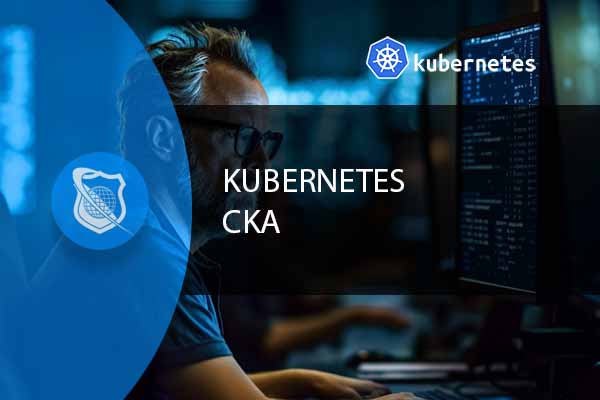In this blog, we will explore the exciting world of a Certified Kubernetes Administrator (CKA), diving into the Certified Kubernetes Administrator salary prospects and the responsibilities that come with this esteemed certification. The tech industry has been rapidly evolving, with cloud computing and containerization technologies becoming pivotal for modern businesses. Kubernetes, an open-source container orchestration platform, has emerged as a dominant force in this field. As organizations increasingly adopt Kubernetes to manage and scale their applications, the demand for skilled Kubernetes administrators has skyrocketed.
Certified Kubernetes Administrator (CKA): An Overview
The Certified Kubernetes Administrator (CKA) certification, offered by the Cloud Native Computing Foundation (CNCF), is a testament to an individual’s expertise in Kubernetes administration. It validates the knowledge and skills required to design, configure, and manage Kubernetes clusters effectively. The CKA certification has gained immense popularity due to its direct correlation with the rapidly growing adoption of Kubernetes in various industries.
Certified Kubernetes Administrator Salary Outlook
One of the most compelling reasons to pursue CKA certification is the promising Certified Kubernetes Administrator salary prospects. As the demand for Kubernetes experts surges, organizations are willing to pay top dollar for skilled administrators. Though salaries can vary depending on factors like location, experience, and the company’s size, a CKA-certified professional can expect an above-average compensation package.
The average Certified Kubernetes Administrator salary for a CKA-certified professional in the United States ranged from $90,000 to $130,000 per year.
Certified Kubernetes Administrator (CKA) Training
DevOps engineers are always in demand. DevOps engineers in Silicon Valley are currently earning a premium of 20% more than software engineers.
Responsibilities of a Certified Kubernetes Administrator
A CKA’s role is critical in ensuring the smooth operation of Kubernetes clusters and optimizing their performance. Their responsibilities are multifaceted and can include:
- Cluster Deployment and Configuration: CKA administrators are proficient in deploying Kubernetes clusters using various deployment tools and configuring them to meet specific organizational needs.
- Cluster Maintenance: They perform ongoing maintenance tasks to ensure cluster health, stability, and security. This includes applying updates, patches, and managing backups.
- Monitoring and Troubleshooting: Monitoring cluster performance and resource utilization is essential to identify bottlenecks and potential issues. CKAs use various tools to diagnose and troubleshoot problems promptly.
- Security Implementation: Implementing robust security measures is crucial to protect Kubernetes clusters from potential cyber threats. CKAs handle authentication, authorization, and network policies to enhance cluster security.
- Resource Management: Efficiently allocating and managing resources within Kubernetes clusters is vital to optimize performance and reduce costs. CKAs handle resource quotas, limits, and scaling as required.
- Application Deployment and Management: CKAs work closely with developers to deploy applications and microservices onto the Kubernetes infrastructure, ensuring they run effectively and efficiently.
- Disaster Recovery and Backup: Implementing disaster recovery plans and regular backups are part of a CKA’s responsibilities to safeguard against data loss and service interruptions.
- Documentation and Collaboration: Documenting cluster configurations, changes, and processes is essential for team collaboration and knowledge sharing.
Kubernetes Administrator Jobs
As a Certified Kubernetes Administrator (CKA), you gain expertise in Kubernetes administration, making you a valuable asset for organizations that use container orchestration and cloud-native technologies. Here are some potential job roles you could pursue with a CKA certification:
Kubernetes Administrator/Engineer: As a Kubernetes Administrator or Engineer, you’ll be responsible for deploying, managing, and maintaining Kubernetes clusters. Your expertise in handling cluster operations, monitoring, and troubleshooting will be essential in ensuring the smooth functioning of containerized applications.
Cloud Infrastructure Engineer: Cloud Infrastructure Engineers with CKA certification are highly sought after by companies utilizing Kubernetes in their cloud environments. Your knowledge of Kubernetes deployment and management will be vital for designing scalable, resilient, and cost-effective cloud infrastructures.
DevOps Engineer: DevOps Engineers work at the intersection of development and operations, focusing on automating processes and improving collaboration between teams. Your Kubernetes skills will enable you to deploy, manage, and monitor containerized applications, enhancing the organization’s development workflows.
Site Reliability Engineer (SRE): SREs are responsible for maintaining high availability, reliability, and performance of services. Your CKA expertise will be crucial in optimizing Kubernetes clusters and implementing best practices to ensure robust and stable applications.
Cloud Solutions Architect: Cloud Solutions Architects design and implement cloud-based solutions for organizations. With a CKA certification, you can architect Kubernetes-based solutions, helping companies achieve scalable and efficient cloud-native infrastructures.
Platform Engineer: Platform Engineers focus on building and maintaining application platforms that support various services. As a CKA-certified professional, you can design and manage Kubernetes platforms to host microservices and other containerized applications.
Containerization Specialist: Containerization Specialists specialize in container technologies like Docker and Kubernetes. Your CKA certification will showcase your expertise in Kubernetes, making you an ideal candidate for roles focused on containerization.
Cloud Consultant: Cloud Consultants provide expert advice to businesses on cloud adoption and migration strategies. Your proficiency in Kubernetes will allow you to offer valuable insights into adopting Kubernetes in cloud environments.
Infrastructure Automation Specialist: Infrastructure Automation Specialists automate infrastructure provisioning and management. Your Kubernetes skills will enable you to automate the deployment and scaling of containerized applications.
DevSecOps Engineer: DevSecOps Engineers integrate security practices into the DevOps pipeline. As a CKA-certified professional, you can implement security measures in Kubernetes clusters to ensure a secure development and deployment process.
Remember that job titles may vary between organizations, and some companies might have unique titles specific to their needs. Additionally, the responsibilities associated with these roles may overlap, depending on the size and structure of the organization.
Conclusion
As Kubernetes continues to transform the landscape of containerization and cloud computing, the demand for Certified Kubernetes Administrators remains strong. With attractive salary packages and a diverse range of responsibilities, the role of a CKA presents an exciting career opportunity for aspiring IT professionals.
If you have a passion for cloud technologies, container orchestration, and problem-solving, obtaining CKA certification could be a decisive step towards a rewarding and well-compensated career in the dynamic world of Kubernetes administration. So, embark on your journey to becoming a CKA and unlock a world of possibilities in the realm of cloud-native computing.
What is the Certified Kubernetes Administrator (CKA) certification?
The Certified Kubernetes Administrator (CKA) certification is a professional certification offered by the Cloud Native Computing Foundation (CNCF). It validates an individual’s expertise in designing, deploying, configuring, and managing Kubernetes clusters effectively. The CKA certification is highly regarded in the industry and demonstrates a candidate’s proficiency in working with Kubernetes for container orchestration.
How can I prepare for the CKA certification exam?
To prepare for the CKA certification exam, you should start by gaining hands-on experience with Kubernetes in real-world scenarios. Familiarize yourself with Kubernetes documentation, official resources, and best practices. Additionally, consider taking online courses and practice exams specifically designed for the CKA certification. Hands-on labs and practical exercises will help you reinforce your knowledge and improve your practical skills.
What is the format of the CKA certification exam?
The CKA certification exam is a practical, performance-based exam that assesses a candidate’s ability to work with Kubernetes in a live environment. The exam is conducted on a dedicated Kubernetes cluster through a web-based terminal. Candidates are given a set of tasks to complete within a specified time frame, typically two hours. Tasks may involve configuring and troubleshooting Kubernetes clusters, deploying applications, and managing various aspects of cluster operations.
How long is the CKA certification valid, and how can I renew it?
The CKA certification is valid for two years from the date of issuance. To renew your certification, you have two options:
a. Retake the CKA exam: You can retake the CKA certification exam before the current certification expires to extend its validity for an additional two years.
b. Earn the Kubernetes Certified Administrator (CKAD) certification: If you hold both the CKA and CKAD certifications, passing either of the exams will automatically renew both certifications for an additional two years.
Is there a prerequisite for taking the CKA certification exam?
There is no formal prerequisite for taking the CKA certification exam. However, it is recommended that candidates have a solid understanding of Kubernetes concepts, hands-on experience with Kubernetes in a production or development environment, and familiarity with command-line tools and editors.












